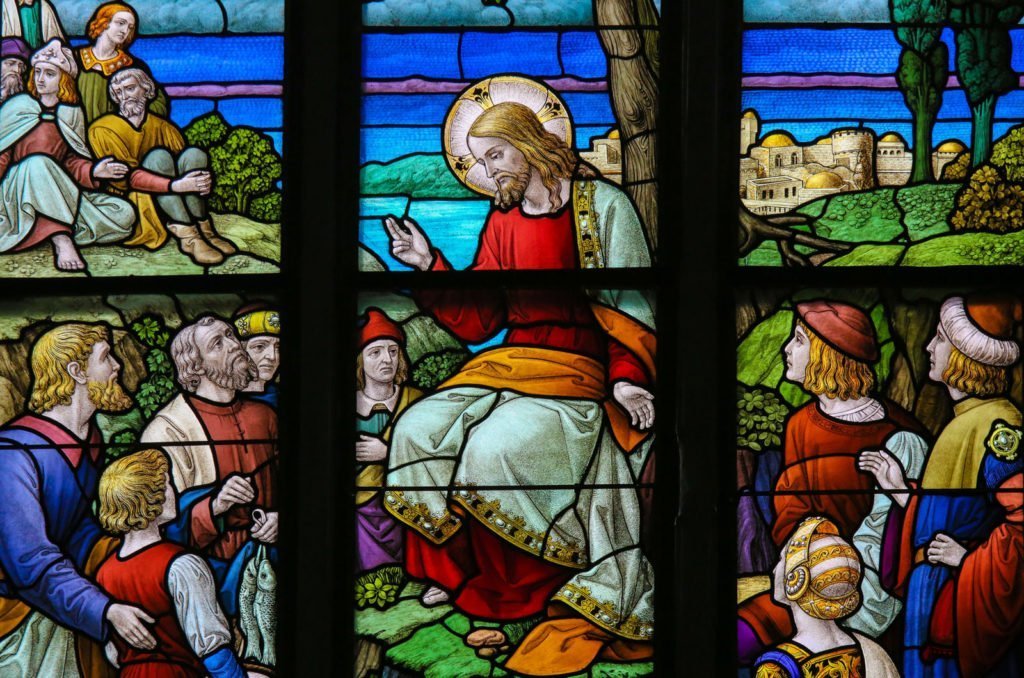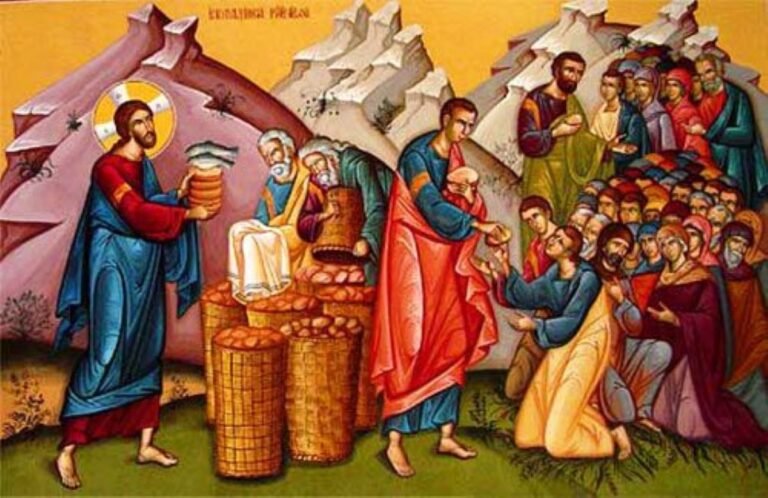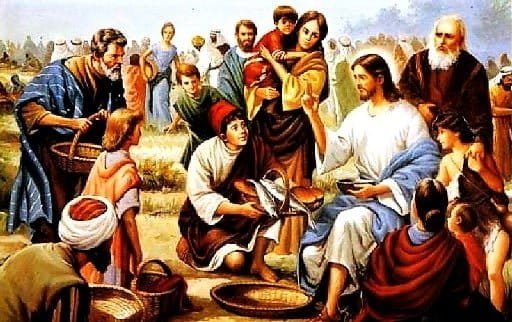POPE FRANCIS’ REFLECTION ON THE 18TH SUNDAY IN ORDINARY TIME YEAR A: THE MULTIPLICATION OF LOAVES AND FISHES.

ANGELUS ADDRESS
2 August 2020
Dear brothers and sisters, good day!
This Sunday’s Gospel presents to us the miracle of the multiplication of the loaves (see Mt 14,13-21). The scene takes place in a deserted place, where Jesus had retired with His disciples. But the people found Him so as to listen to Him and to be healed: indeed, His words and His gestures restore and bring hope. At sundown, the crowd was still present and the disciples, practical men, invited Jesus to send them away so that they could go and find something to eat. But He answered: “You give them something to eat” (v. 16). We can imagine the disciples’ faces! Jesus was well aware of what He was about to do, but He wanted to change their attitude: not to say, “send them away,” “let them fend for themselves”, “let them find something to eat”, but rather, “what does Providence offer us to share?” These are two opposite ways of behaving. And Jesus wants to bring them to the second way of behaving because the first proposal is that of the practical person, but is not generous: “send them away so they can go and find, let them fend for themselves.” Jesus thinks another way. Jesus wants to use this situation to educate His friends, both then and now, about God’s logic. And what is God’s logic that we see here? The logic of taking responsibility for others. The logic of not washing one’s hands, the logic of not looking the other way. No. The logic of taking responsibility for others. That “let them fend for themselves” should not enter into the Christian vocabulary.
As soon as one of the Twelve says, realistically, “We have here only five loaves of bread and two fish”, Jesus answers, “Bring them here to me” (vv. 17-18). He takes the food in His hands, raises His eyes heavenward, recites the blessing and begins to break it and give the pieces to the disciples to hand out. And those loaves and fish did not run out; there was enough, and plenty left over for thousands of people.
With this gesture, Jesus demonstrates His power; not in a spectacular way but as a sign of charity, of God the Father’s generosity toward His weary and needy children. He is immersed in the life of His people, He understands their fatigue and their limitations, but He does not allow anyone to be lost, or to lose out: He nourishes them with His word and provides food in plenty for sustenance.
In this Gospel passage we can perceive a reference to the Eucharist, especially in the description of the blessing, the breaking of the bread, delivery to the disciples, and distribution to the people (v. 19). It is noteworthy how close the link is between the Eucharistic bread, nourishment for eternal life, and daily bread, necessary for earthly life. Before offering Himself to the Father as the Bread of salvation, Jesus ensures there is food for those who follow Him and who, in order to be with Him, forgot to make provisions. At times the spiritual and the material are in opposition, but in reality spiritualism, like materialism, is alien to the Bible. It is not biblical language.
The compassion and tenderness that Jesus showed towards the crowds is not sentimentality, but rather the concrete manifestation of the love that cares for the people’s needs. And we are called to approach the Eucharistic table with these same attitudes of Jesus: compassion for the needs of others, this word that is repeated in the Gospel when Jesus sees a problem, an illness or these people without food… “He had compassion.” “He had compassion”. Compassion is not a purely material feeling; true compassion is patire con [to suffer with], to take others’ sorrows on ourselves. Perhaps it would do us good today to ask ourselves: Do I feel compassion when I read news about war, about hunger, about the pandemic? So many things… Do I feel compassion toward those people? Do I feel compassion toward the people who are near to me? Am I capable of suffering with them, or do I look the other way, or “they can fend for themselves”? Let us not forget this word “compassion,” which is trust in the provident love of the Father, and means courageous sharing.
May Mary Most Holy help us to walk the path that the Lord shows us in today’s Gospel. It is the journey of fraternity, which is essential in order to face the poverty and suffering of this world, especially in this tragic moment, and which projects us beyond the world itself, because it is a journey that begins with God and returns to God.
ANGELUS ADDRESS
3 August 2014
Dear Brothers and Sisters Good morning,
This Sunday [18TH SUNDAY IN ORDINARY TIME YEAR A], the Gospel presents to us the miracle of the multiplication of loaves and fish (Mt 14:13-21). Jesus performed it along the Lake of Galilee, in a deserted place where he had withdrawn with his disciples after learning of the death of John the Baptist. But many people followed them and joined them there; and upon seeing them, Jesus felt compassion and healed their sick until the evening. And seeing the late hour, the disciples became concerned and suggested that Jesus send the crowd away so they could go into the villages and buy food to eat. But Jesus calmly replied: “You give them something to eat” (Mt 14:16); and he asked them to bring five loaves and two fish, blessed them, began to break them and give them to the disciples, who distributed them to the people. They all ate and were satisfied, and there were even leftovers!
We can understand three messages from this event. The first is compassion. In facing the crowd who follows him and — so to speak — “won’t leave him alone”, Jesus does not react with irritation; he does not say: “These people are bothering me”. No, no. He reacts with a feeling of compassion, because he knows they are not seeking him out of curiosity but out of need. But attention: compassion — which Jesus feels — is not simply feeling pity; it’s more! It means to suffer with, in other words to empathize with the suffering of another, to the point of taking it upon oneself. Jesus is like this: he suffers together with us, he suffers with us, he suffers for us. And the sign of this compassion is the healing of countless people he performed. Jesus teaches us to place the needs of the poor before our own. Our needs, even if legitimate, are not as urgent as those of the poor, who lack the basic necessities of life. We often speak of the poor. But when we speak of the poor, do we sense that this man or that woman or those children lack the bare necessities of life? That they have no food, they have no clothing, they cannot afford medicine…. Also that the children do not have the means to attend school. Whereas our needs, although legitimate, are not as urgent as those of the poor who lack life’s basic necessities.
The second message is sharing. The first is compassion, which Jesus felt, and the second is sharing. It’s helpful to compare the reaction of the disciples with regard to the tired and hungry people, with that of Jesus. They are different. The disciples think it would be better to send them away so they can go and buy food. Jesus instead says: “you give them something to eat”. Two different reactions, which reflect two contrasting outlooks: the disciples reason with worldly logic, by which each person must think of himself; they reason as if to say: “Sort it out for yourselves”. Jesus reasons with God’s logic, which is that of sharing. How many times we turn away so as not to see our brothers in need! And this looking away is a polite way to say, with white gloves, “Sort it out for yourselves”. And this is not Jesus’ way: this is selfishness. Had he sent away the crowds, many people would have been left with nothing to eat. Instead those few loaves and fish, shared and blessed by God, were enough for everyone. And pay heed! It isn’t magic, it’s a “sign”: a sign that calls for faith in God, provident Father, who does not let us go without “our daily bread”, if we know how to share it as brothers.
Compassion, sharing. And the third message: the miracle of the loaves foreshadows the Eucharist. It is seen in the gesture of Jesus who, before breaking and distributing the loaves, “blessed” them (Mt 14:19). It is the same gesture that Jesus was to make at the Last Supper, when he established the perpetual memorial of his Redeeming Sacrifice. In the Eucharist Jesus does not give just any bread, but the bread of eternal life, he gives Himself, offering Himself to the Father out of love for us. But we must go to the Eucharist with those sentiments of Jesus, which are compassion and the will to share. One who goes to the Eucharist without having compassion for the needy and without sharing, is not at ease with Jesus.
Compassion, sharing, Eucharist. This is the path that Jesus points out to us in this Gospel. A path which brings us to face the needs of this world with fraternity, but which leads us beyond this world, because it comes from God the Father and returns to Him. May the Virgin Mary, Mother of Divine Providence, accompany us on this journey.

